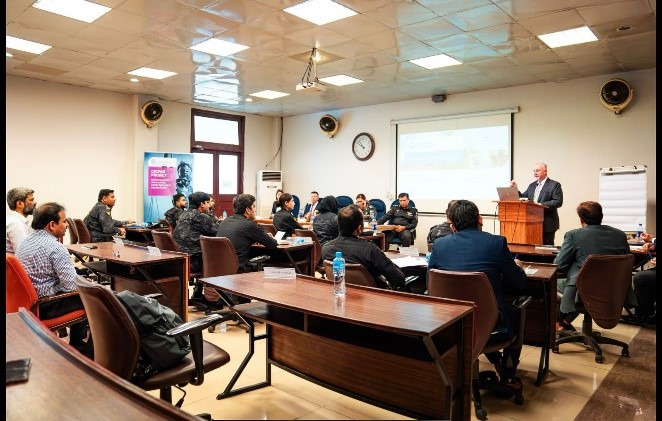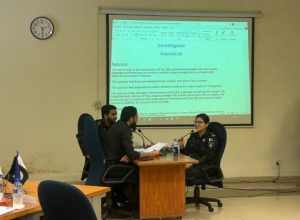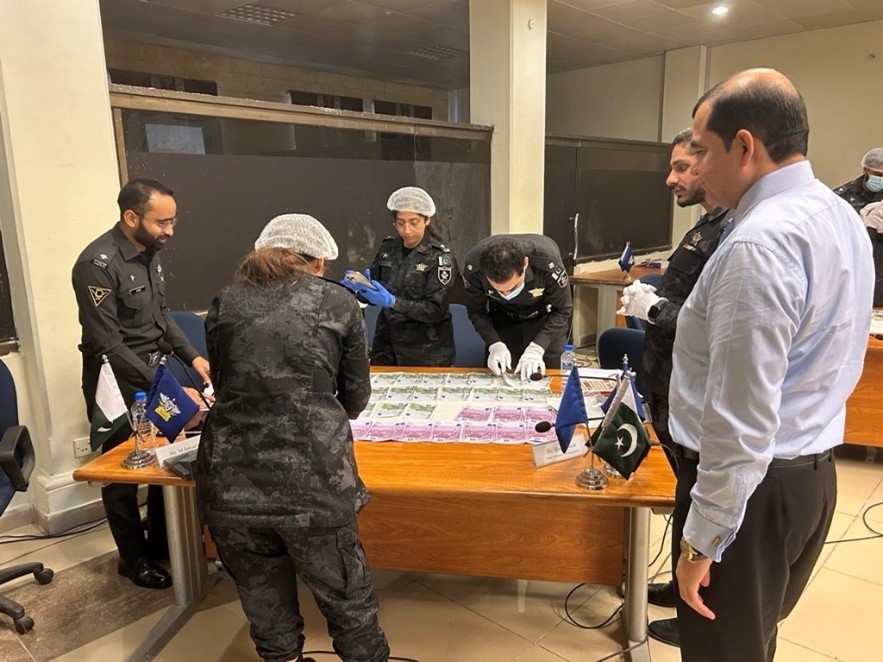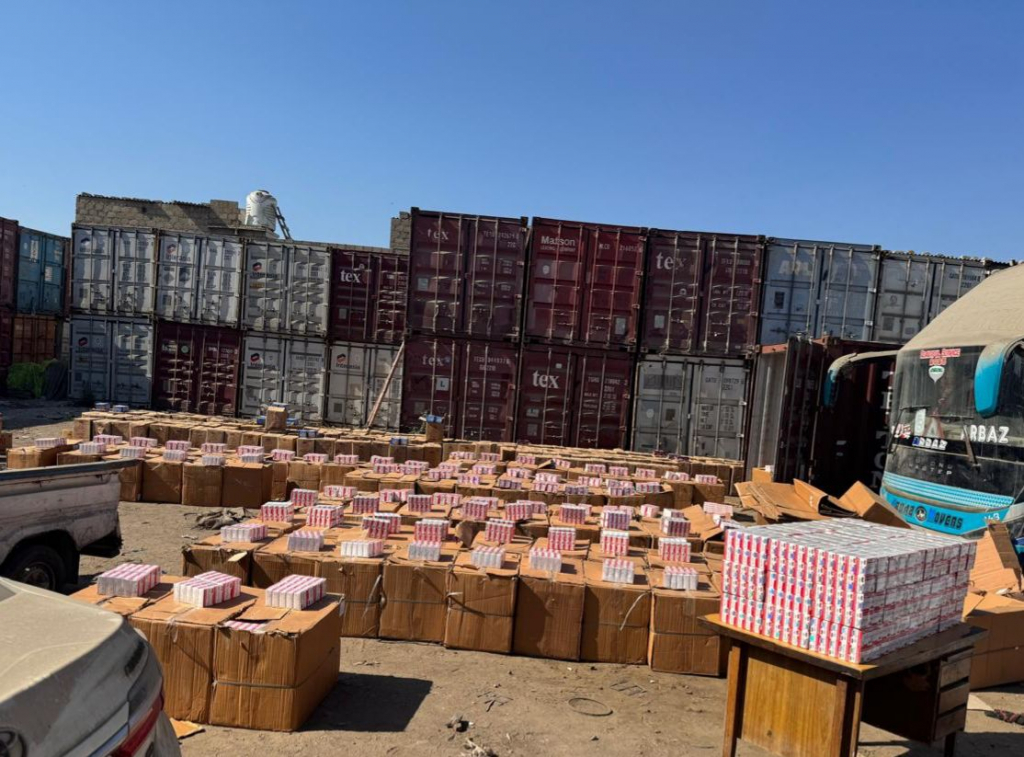Pakistan Customs enhances enforcement working methods
23 June 2025
By the WCO Secretariat COPES teamSince 2020, Pakistan Customs has been working with the WCO Secretariat to enhance working methods used to combat fraud, from the identification of an offence to the storage of seized assets, including reporting, collecting and preserving evidence.
Customs seizures are the starting point of a process which, if well managed, concludes with offenders being punished and, in the most serious cases, the product of their infringements being permanently seized. Regardless of the enforcement powers they may have, Customs officers play a critical role in this process by reporting, collecting and preserving evidence to ensure that investigations and prosecutions are successful.
A few years ago, Pakistan Customs decided to re-examine these practices and processes with a view to establishing a stronger enforcement culture among staff based on a solid training in enforcement procedures and investigation techniques.
WCO COPES Programme
The WCO had been working on this topic since 2012 when it published the first edition of the Customs Operational Practices for Enforcement and Seizures (COPES) Compendium. This publication called for a paradigm shift in Customs’ approach to enforcement, so as to take account of the needs of investigative and judicial authorities. It emphasized the need to have systems in place that ensure a degree of “due process” for the parties involved, including a high level of transparency and integrity. Doing so not only increases the probability of penalties against offenders; it also acts as a deterrent to future illicit activity.
In 2017, the COPES Programme was created to enable the WCO Secretariat to offer technical assistance to Customs administrations as a complement to other WCO enforcement programmes dealing with specific commodities (drugs, goods covered by multilateral environmental agreements, etc.) or specific issues (security, money-laundering, revenue, etc.). Expert trainers were accredited, training courses developed and seminars organized. In 2024, after receiving new input from Customs administrations and collecting insights from experts involved in capacity-building activities, the WCO updated the COPES Compendium, adding two new chapters, one on investigative techniques and the other on prosecutions. Finally, to assist Customs administrations in gaining a better understanding of potential areas for improvement, the WCO released the Maturity Institutional Assessment tool and methodology in the area of Customs Enforcement.
Two projects designed for Pakistan
Thanks to funding provided by the Bureau of International Narcotics and Law Enforcement Affairs (INL) of the United States Department of State (US DoS), Pakistan Customs has been benefiting since 2020 from the support of the COPES Programme. The WCO Secretariat carried out an institutional assessment of the Pakistan Customs Service using the COPES assessment tool, which was instrumental in identifying areas for improvement and drafting a Maturity Growth Plan.
The assessment shed light on the need to train the next generation of Customs managers to allow for a structural change in the professional culture of Customs staff. Pakistan’s future assistant collectors, who were to be responsible for supervising operational and front-line officers at ports of entry and providing them with guidance on search, seizure and arrest procedures, as well as the preparation of administrative and seizure reports, were identified as the category of staff on which this change in approach should be focused during the early stage of their training at the Pakistan Customs Academy.
As part of a project called the Customs Enforcement Curriculum for Assistant Collectors (CECAC) and funded by the INL, a dedicated team at the WCO Secretariat developed training material designed specifically for use by the Academy, where future assistant collectors are trained over the course of one year. The team also organized training activities with the Academy and initiated a train-the-trainer process to build sustainable and autonomous training capacity in the Customs administration.
In 2024, a follow-up project called the Customs Enforcement Curriculum for Pakistan (CECPAK) was launched. This project, while being a continuation of what has already been undertaken under the CECAC initiative, also addresses the needs of investigators, middle managers and preventive officers (IMMPOs), in addition to those of Customs assistant collectors, trainers and instructors. CECPAK furthermore provides “front-line mentoring” to ensure a supervised application of the methods and techniques taught in the operational environment.

Completed activities

To date, as of June 2025, 19 newly recruited assistant collectors and 15 IMMPOs have completed two to three weeks of training, addressing a wide range of topics and working methods with a view to improving their professional practices, techniques and understanding of current trends. A diverse range of training techniques are used, including practical exercises such as role-plays which have been particularly well received by participants. Using active methods of training and limiting the number of officers being trained enables trainers to ensure that participants grasp and assimilate knowledge and know-how quickly.
All trained officers have been asked to share their expertise with their colleagues and team members in order to build, step by step, a sound culture of enforcement across the organization. This trickle-down effect is reinforced by the organization of a train-the-trainer scheme, aimed at supporting six Pakistan Customs officers in becoming trainers for their peers. Some of them may be offered the opportunity to become COPES accredited experts and, in turn, support training activities led by the WCO Secretariat. One of the main benefits of this peer-to-peer approach to capacity building is that both experts and participants learn from the process. Trainers not only refine their skills; they also learn from the process and may even take some ideas back with them when they return home.

Driving cultural change is, by nature, a long-term process. WCO experts will work with small groups of trained assistant collectors and IMMPOs in order to observe how they apply the knowledge and know-how they have acquired in actual day-to-day operations. They will also conduct field-based practical exercises to help reinforce classroom training.

Impact
The training is already paying off. There was a 173.6% increase in the overall value of seized goods in the financial year 2024/2025. In the same period, 37 high-value cases were identified exclusively using profiling techniques, whereas, in previous years, profiling-based interdictions had remained minimal. These cases resulted in the detection of duty and tax evasions amounting to approximately PKR 4.37 billion (1.36 billion euros), accounting for around 24% of the total number of interdictions made during the current financial year.
One of the most important cases involved a large shipment of 5.6 million tramadol pills concealed in a container intended for export that was identified using profiling techniques. A number of dangerous food items were also seized, including vegetable seeds valued at over PKR 632 million and sorghum seeds worth approximately PKR 226 million.
All seizures were duly documented and led to successful prosecutions.
More information
Contact the WCO COPES team

